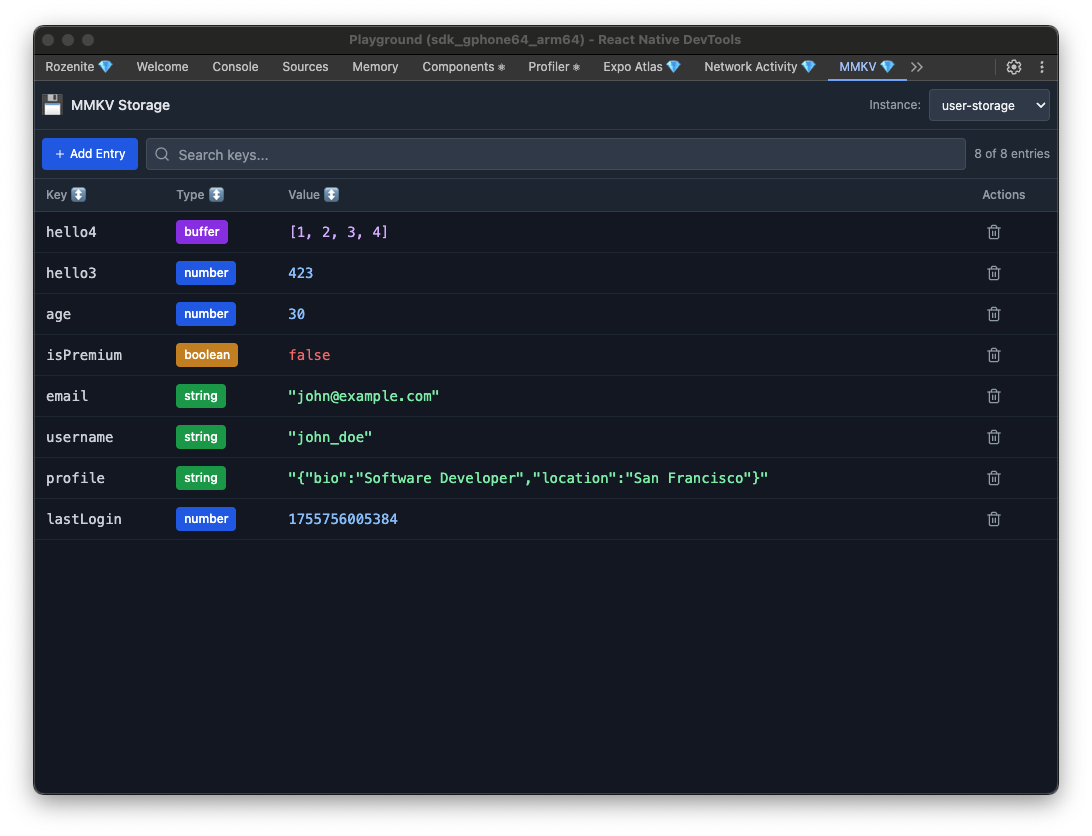MMKV Plugin

The MMKV plugin provides comprehensive storage inspection and management for React Native applications using MMKV, offering real-time data visualization and editing capabilities directly within your DevTools environment.
What is MMKV Plugin?
The MMKV plugin is a powerful debugging tool that helps you inspect and manage MMKV storage instances in your React Native application. It provides:
- Real-time Storage Inspection: View all MMKV instances and their contents in real-time
- Multi-Instance Support: Manage and inspect multiple MMKV instances simultaneously
- Data Type Detection: Automatically detects and displays different data types (string, number, boolean, buffer)
- Search & Filter: Quickly find specific keys with real-time search functionality
- Visual Data Representation: Color-coded type indicators and formatted value display
- Data Management: Add, edit, and delete entries directly from the DevTools interface
- Type-aware Editing: Input validation based on data types when editing entries
- Blacklist Filtering: Filter out sensitive data or large binary blobs using regex patterns
Installation
Make sure to go through the Getting Started guide before installing the plugin.
Install the MMKV plugin and its peer dependencies:
Add the DevTools hook to your React Native app to enable MMKV storage inspection:
Usage
Once configured, the MMKV plugin will automatically appear in your React Native DevTools sidebar as "MMKV Storage". Click on it to access:
Storage Instance Management
- Instance Selection: Choose which MMKV instance to inspect from a dropdown
- Multi-Instance View: Switch between different storage instances easily
- Real-time Updates: See changes to your MMKV storage as they happen
Data Inspection and Management
- Key-Value Display: View all stored keys with their types and values
- Type Indicators: Visual indicators for different data types:
- String: Text values with proper formatting
- Number: Numeric values (integers and floats)
- Boolean: True/false values
- Buffer: Binary data representation
- Search Functionality: Filter entries by key name for quick access
- Blacklist Filtering: Hide sensitive or large data using RegExp patterns
- Data Editing: Modify existing values with type validation
- Entry Management: Add new entries or delete existing ones
Configuration
Blacklist Filtering
The MMKV plugin supports filtering out specific properties using RegExp patterns. This is useful for hiding sensitive data or large binary blobs that might slow down the DevTools.
The blacklist RegExp is matched against {storageId}:{key} format:
This example filters out:
- Any key containing "token", "password", or "secret" across all storages
- Keys ending with "Binary" in the cache-storage instance
- Any key containing "temp" in any storage instance
You can combine multiple patterns using the | operator to create comprehensive filtering rules that hide sensitive data while keeping your DevTools interface clean and performant.
Important Notes
You must explicitly provide all MMKV instances you want to inspect to the useMMKVDevTools hook. The plugin cannot automatically detect MMKV instances - only the storages you pass in the storages record will be available in the DevTools interface.
The MMKV plugin is automatically disabled in production builds for security and performance reasons.
Best Practices
Storage Organization
- Use Descriptive IDs: Give your MMKV instances meaningful identifiers
- Separate Concerns: Use different instances for different data types (user data, settings, cache)
- Consistent Naming: Follow a naming convention for your storage instances
Development Workflow
- Monitor Storage Changes: Use the real-time updates to debug storage-related issues
- Test Data Persistence: Verify that data is stored and retrieved correctly
- Debug State Issues: Inspect storage contents when debugging app state problems
Contributing
The MMKV plugin is open source and welcomes contributions! Check out the Plugin Development Guide to learn how to contribute or create your own plugins.
Support
If you encounter issues with the MMKV plugin:
- Check Documentation: Review this guide for common solutions
- Verify Setup: Ensure
react-native-mmkvis properly installed and configured - Search Issues: Look for similar issues in the repository
- Create Issue: Report bugs or request features
- Community: Reach out to the Rozenite community for help
Next: Learn about Plugin Development to create your own plugins, or explore other Official Plugins.
